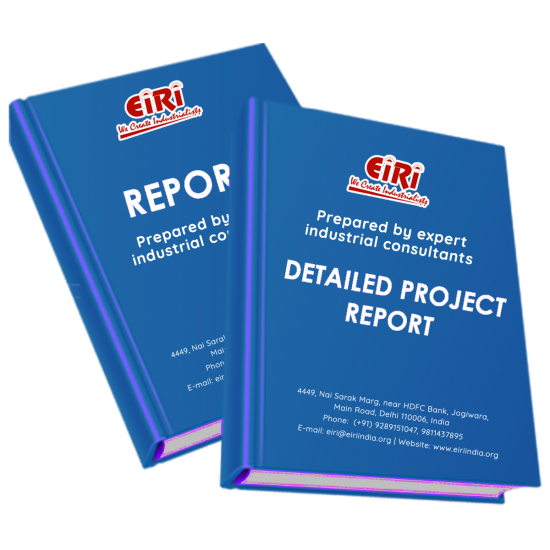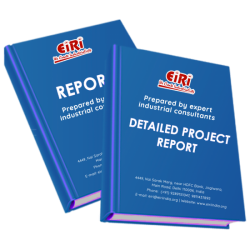Detailed Project Report on Diammonium Phosphate (DAP)

- More than 40 years of experience
- Managed by expert industrial consultants
- ISO 9001-2015 Certified
- Registered under MSME, UAM No: DL01E0012000
- 24/5 Research Support
Get your quesries resolved from an industry expert. Ask your queries before report or book purchase. - Custom Research Service
Speak to the our consultant to design an exclusive study to serve your research needs. - Quality Assurance
All reports are prepared by highly qualified consultants & verified by a panel of experts. - Information Security
Your personal & confidential information is safe & secure.
DIAMMONIUM PHOSPHATE (DAP)
[EIRI/EDPR/1779] J.C. 624
INTRODUCTION
Diammonium phosphate (DAP) (chemical formula (NH4)2HPO4, IUPAC name diammonium hydrogen phosphate) is one of a series of water-soluble ammonium phosphate salts that can be produced when ammonia reacts with phosphoric acid. Solid diammonium phosphate shows a dissociation pressure of ammonia as given by the following expression and equation:
(NH4)2HPO4(s) is in equilibrium with NH3(g) + NH4H2PO4(s)
log PmmHg = −3063 / T + 175 log T + 3.3
Where:
P = the resultant dissociation pressure of ammonia
T = absolute temperature (K)
At 100°C, the dissociation pressure of diammonium phosphate is approximately 5 mmHg.
DAP is used as a fertilizer. When applied as plant food, it temporarily increases the soil pH, but over a long term the treated ground becomes more acidic than before upon nitrification of the ammonium. It is incompatible with alkaline chemicals because its ammonium ion is more likely to convert to ammonia in a high-pH environment. The average pH in solution is 7.5–8. The typical formulation is 18-46-0 (18% N, 46% P2O5, 0% K2O).
DAP can be used as a fire retardant. It lowers the combustion temperature of the material, decreases maximum weight loss rates, and causes an increase in the production of residue or char.[6] These are important effects in fighting wildfires as lowering the pyrolysis temperature and increasing the amount of char formed reduces that amount of available fuel and can lead to the formation of a firebreak. It is the largest component of some popular commercial firefighting products.
DAP is also used as a yeast nutrient in winemaking and brewing mead; as an additive in some brands of cigarettes purportedly as a nicotine enhancer; to prevent afterglow in matches, in purifying sugar; as a Flux for soldering tin, copper, zinc and brass; and to control precipitation of alkali-soluble and acid-insoluble colloidal dyes on wool.
Diammonium phosphate (DAP) (chemical formula (NH4)2HPO4 )
It is one of a series of water-soluble ammonium phosphate salts which can be produced when ammonia reacts with phosphoric acid. DAP is used as a fertilizer and a fire retardant. When applied as plant food, it temporarily increases the soil pH (more basic), but over a long term the treated ground becomes more acidic than before upon nitrification of the ammonium. It is incompatible with alkaline chemicals because its ammonium ion is more likely to convert to ammonia in a high-pH environment.
Product containing diammonium phosphate as essential ingredient with small amount of mono ammonium phosphate Total nitrogen: x (18-21)% P2O5 soluble in neutral ammonium citrate and water: y (45-53)%
Diammonium Phosphate (DAP) is also known as Ammonium Phosphate dibasic (ammonium phosphate secondary diammonium hydrogen phosphate) (NH4)2 HPO4.
Diammonium Phosphate (DAP) is a high analysis fertlizer containing 18% by wt of ammonical nitrogen and 46% by wt of P2O5 The P2O5 present in Diammonium Phosphate (DAP) is mostly water soluble. It is white crystals or powder.
Diammonium Phosphate is used all over India. Imported Diammonium Phosphate is also used to meet the consumption demand in the country. Diammonium Phosphate is extensively used and account for about 60% of total P2O5 produced in the country.
For a long time solid ammonium phosphate fertilizers were produced only in granular form in an integrated neutralization-granulation process. This is still the case for DAP but considerable capacity has existed for producing MAP in powder form. This product is used as a intermediate for compound- fertilizer manufacture.
The high ammonium vapour pressere of DAP has important consequences for its industrial production. the same applies to the pronounced maximum solubility of a mixture MAD and DAP at an NIP molar ratio of 1.4 (eutectic mixture containing 17% water)
COST ESTIMATION
Plant Capacity 75 MT/Day
Land & Building (5 Acres) Rs. 11.30 Cr
Plant & Machinery Rs. 10.00 Cr
Working Capital for 3 Months Rs. 33.29 Cr
Total Capital Investment Rs. 55.31 Cr
Rate of Return 25%
Break Even Point 48%
CONTENTS
INTRODUCTION
USES & APPLICATIONS
OTHERS & APPLICATIONS OF DIAMMONIUM PHOSPHATE
PROPERTIES & CHARACTERISTICS
GRADES OF DIAMMONIUM PHOSPHATE
FERTILIZER GRADE AMMONIUM PHOSPHATE
CHEMICAL COMPOSITION OF DIAMMONIUM PHOSPHATE FERTILIZER
B.I.S.SPECIFICATIONS
SPECIFICATIONS OF DIAMMONIUM PHOSPHATE
MARKET SURVEY
PRESENT MANUFACTURS/SUPPLIERS OF DIAMMONIUM PHOSPHATE
RAW MATERIALS
MANUFACTURING PROCESS OF DIAMMONUM PHOSPHATE
RAW MATERERIALS REQUIRMENTS
PROCESS FLOW DIAGRAM
RAW MATERIALS REQUIRMENTS/DAY
MANUFACTURING PROCESS OF DIAMMONIUM PHOSPHATE
FROM ROCK PHOSPHATE
PROCESS IN DETAILS
METHOD OF OPTIMIZATION OF DIAMMONIUM PHOSPHATE (DAP) PLANT
THE JACOBS SLURRY PROCESS
PLANT LAYOUT
COMPLETE PLANT SUPPLIERS
SUPPLIERS OF PLANT & MACHINERY
SUPPLIERS OF RAW MATEERIALS
APPENDIX – A:
01. PLANT ECONOMICS
02. LAND & BUILDING
03. PLANT AND MACHINERY
04. OTHER FIXED ASSESTS
05. FIXED CAPITAL
06. RAW MATERIAL
07. SALARY AND WAGES
08. UTILITIES AND OVERHEADS
09. TOTAL WORKING CAPITAL
10. TOTAL CAPITAL INVESTMENT
11. COST OF PRODUCTION
12. TURN OVER/ANNUM
13. BREAK EVEN POINT
14. RESOURCES FOR FINANCE
15. INSTALMENT PAYABLE IN 5 YEARS
16. DEPRECIATION CHART FOR 5 YEARS
17. PROFIT ANALYSIS FOR 5 YEARS
18. PROJECTED BALANCE SHEET FOR (5 YEARS)
How to Make Project Report?
Detailed Project Report (DPR) includes Present Market Position and Expected Future Demand, Technology, Manufacturing Process, Investment Opportunity, Plant Economics and Project Financials. comprehensive analysis from industry covering detailed reporting and evaluates the position of the industry by providing insights to the SWOT analysis of the industry.
Each report include Plant Capacity, requirement of Land & Building, Plant & Machinery, Flow Sheet Diagram, Raw Materials detail with suppliers list, Total Capital Investment along with detailed calculation on Rate of Return, Break-Even Analysis and Profitability Analysis. The report also provides a birds eye view of the global industry with details on projected market size and then progresses to evaluate the industry in detail.
We can prepare detailed project report on any industry as per your requirement.
We can also modify the project capacity and project cost as per your requirement. If you are planning to start a business, contact us today.
Detailed Project Report (DPR) gives you access to decisive data such as:
- Market growth drivers
- Factors limiting market growth
- Current market trends
- Market structure
- Key highlights
Overview of key market forces propelling and restraining market growth:
- Up-to-date analyses of market trends and technological improvements
- Pin-point analyses of market competition dynamics to offer you a competitive edge major competitors
- An array of graphics, BEP analysis of major industry segments
- Detailed analyses of industry trends
- A well-defined technological growth with an impact-analysis
- A clear understanding of the competitive landscape and key product segments
Need Customized Project Report?
- Ask for FREE project related details with our consultant/industry expert.
- Share your specific research requirements for customized project report.
- Request for due diligence and consumer centric studies.
- Still haven't found what you're looking for? Speak to our Custom Research Team
About Engineers India Research Institute:
Our Approach
- Our research reports comprehensively cover Indian markets (can be modified as per your country), present investigation, standpoint and gauge for a time of five years*.
- The market conjectures are produced on the premise of optional research and are cross-accepted through associations with the business players
- We use dependable wellsprings of data and databases. What's more, data from such sources is handled by us and incorporated into the report
Why buy EIRI reports?
- Our project reports include detailed analysis that help to get industry Present Market Position and Expected Future Demand.
- Offer real analysis driving variables for the business and most recent business sector patterns in the business
- This report comprehends the present status of the business by clarifying a complete SWOT examination and investigation of the interest supply circumstance
- Report gives investigation and top to bottom money related correlation of real players/competitors
- The report gives gauges of key parameters which foresees the business execution























